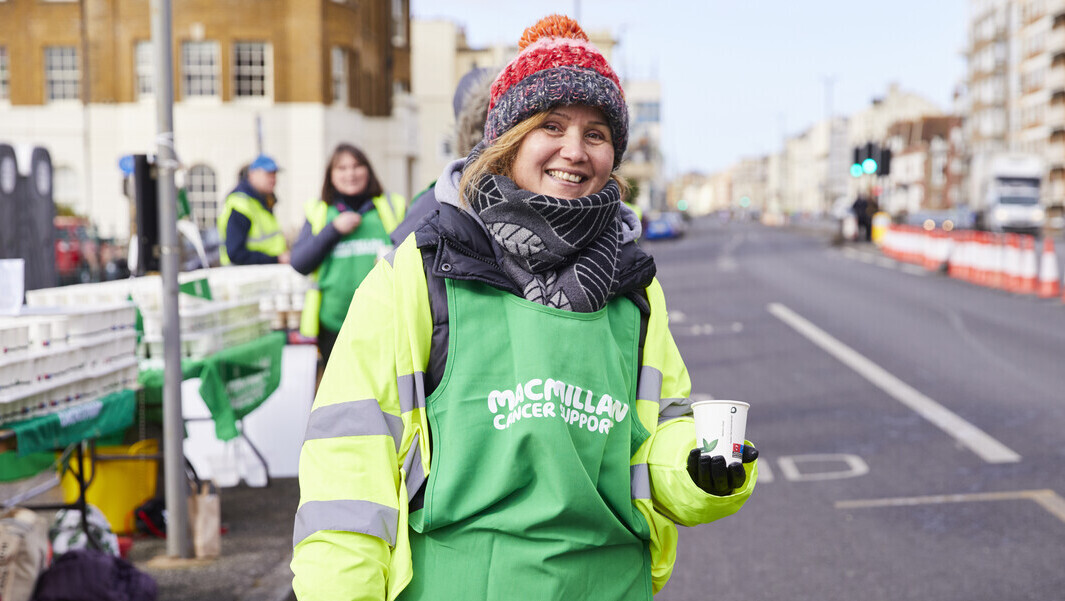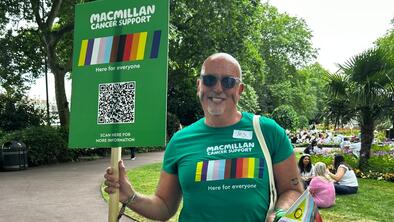Doug's story
Doug, 55, had always been active and healthy. But after a fall at home in late 2023, he received a diagnosis that changed everything.
“I fractured my hip, having fallen down the stairs,” Doug says. “The doctors were concerned because I was 52 years old and pretty fit. They did lots of tests, and eventually I was diagnosed with renal cancer, which was spreading to my bones – hence the fracture.”
In the months that followed, Doug had two hip replacements, a knee repair and, ultimately, an amputation below the knee in early 2025. At the same time, he began immunotherapy to manage his condition and was told that his cancer was not curable.
Discovering the Buddy service
Doug first heard about the Macmillan Telephone Buddy service early in his diagnosis.
“I liked the idea of having a Buddy – somebody that had either been through something very similar to me, or who had the knowledge of the things I was going through to be able to support me.”
He was matched with Bernie in October 2024. From the start, she made the process feel easy.
“As the recipient of the service, I think I started off quite cautiously. You're not quite sure what you're supposed to say, but Bernie was particularly good at breaking down a lot of those barriers.”
Why it helped to talk to someone outside the family
Although Doug has family around him, he found it hugely helpful to speak to someone outside of that circle.
“I've got a wife, I've got five kids, and plenty of family who I can talk to. But having that person who was completely independent of what was going on was hugely beneficial. Yes, I can speak to family members, but they're dealing with a lot of emotions too, so sometimes it’s difficult.”
“As the relationship with your Buddy builds up, it becomes like having a really close friend to open up to – I could tell her what I was going through and how I felt about it. I could unload everything.”
Doug appreciated Bernie’s background as a nurse and her understanding of what he was facing.
“It always surprised me how much knowledge and understanding she had of what I was going through and how I might feel. It was just amazing to have that person to rely on.”
Flexible support when it mattered most
Their calls were flexible – sometimes weekly, sometimes timed around key moments.
“I get very stressed out before oncology appointments, so I regularly talked to her beforehand. She helped take some of the anxiety away from that process.”
Doug says the service gave him a safe space to be open.
“It's a very safe and free environment. If you need someone completely detached from your situation, it's a great help. Bernie was always encouraging me and putting my mind at rest. She helped keep me in a positive frame of mind, and I found her support invaluable.”
Bernie's story
When Bernie retired after a 43-year nursing career, she knew that she still had more to give. She now supports people with cancer as a Macmillan Telephone Buddy – offering a listening ear, empathy and encouragement.
“I retired in March 2024, and I just missed my job so much,” Bernie says. “I decided I’d like to start volunteering for Macmillan, and when the Buddy scheme came up, I thought that it sounded ideal.”
Bernie’s background includes decades of working in the community, often with people with cancer and in palliative care, as well as a role as the director of nursing at a hospice.
“I knew a lot about Macmillan already,” she says. “I’d worked closely with their teams in Northern Ireland, and they were always inspirational and leading the way in the community. So, when it came to volunteering, Macmillan was a natural choice”.
Why telephone support works
“The people I speak to in my role have either been living with cancer or are in palliative care,” she says. “It’s all about communication. It’s about listening to their story, helping them find ways to overcome their challenges, and encouraging them to live life as fully as they can.”
Bernie says the telephone format often leads to greater honesty.
“People can sometimes express themselves more freely when it’s not face to face. It’s amazing how open people are when they don’t know you. A lot of people are trying to protect their loved ones, so they aren’t always open when they’re feeling low or in pain. Talking to a neutral person gives them that space.”





